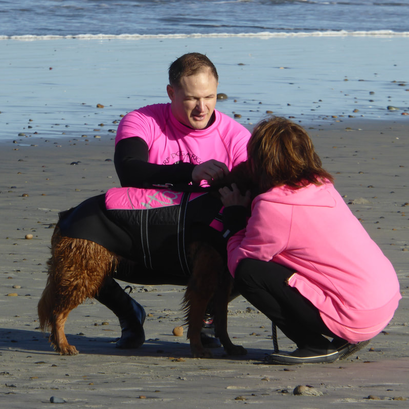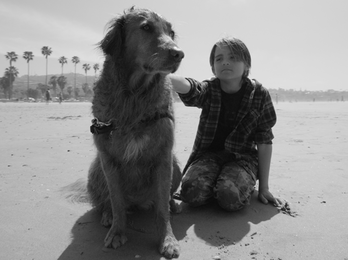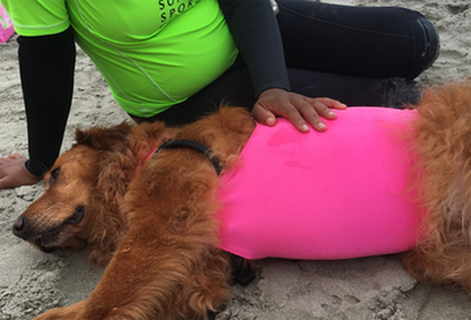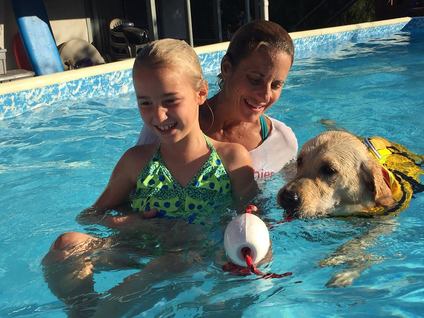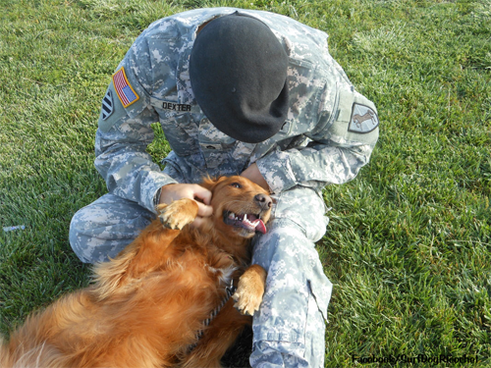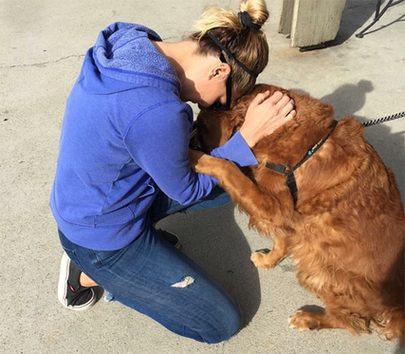DOG BEHAVIOR - ALERTING
Dogs use a myriad of behaviors to alert their handlers, such as licking, panting, looking away, pawing, staring at you, nudging, leaning, eye contact, jumping on your lap, becoming antsy, laying their head on your lap, sniffing, whining and more.
The alerting behavior Ricochet uses the most is planting... stopping and not moving forward. She stops to prevent the individual from entering an anxiety or trigger situation. It also allows them to assess the situation, check the environment, reflect on what they’re feeling emotionally, regroup and catch their breath. Places with a lot of people, sudden noises, blind corners, tight quarters, etc can trigger emotional reactions.
When she plants, I always look at the environment to see what she could be alerting to. Sometimes, she recognizes something that the individual may consider a threat. Other times, she goes way beyond the surface of a person. She goes to their soul… to their core. I have learned to interpret her alerts based on her behavior and the environment.
Ricochet is a certified goal-directed therapy dog with Paws'itive Teams and Naval Medical Center San Diego's canine therapy program. Over a six week period, active duty service members with PTSD handle our therapy dogs while re-entering the community for two hours at a time. The locations are dog friendly, or special permission is given by business owners.
The alerting behavior Ricochet uses the most is planting... stopping and not moving forward. She stops to prevent the individual from entering an anxiety or trigger situation. It also allows them to assess the situation, check the environment, reflect on what they’re feeling emotionally, regroup and catch their breath. Places with a lot of people, sudden noises, blind corners, tight quarters, etc can trigger emotional reactions.
When she plants, I always look at the environment to see what she could be alerting to. Sometimes, she recognizes something that the individual may consider a threat. Other times, she goes way beyond the surface of a person. She goes to their soul… to their core. I have learned to interpret her alerts based on her behavior and the environment.
Ricochet is a certified goal-directed therapy dog with Paws'itive Teams and Naval Medical Center San Diego's canine therapy program. Over a six week period, active duty service members with PTSD handle our therapy dogs while re-entering the community for two hours at a time. The locations are dog friendly, or special permission is given by business owners.
|
But, it’s really a team effort when we work with military with PTSD. Ricochet communicates through her behavior, I interpret the behavior, and the service member validates it. On most occasions Ricochet is able to sense subtle changes in people’s physiological, psychological, and emotional well-being—even if those changes aren’t obvious to the people experiencing them. When they are feeling stressed, beginning to have a panic attack, anxiety response, increased pain, or other compromising symptoms, she alerts them, which interrupts their response and helps them to refocus on her and work through the problem. However, she often alerts before the individual is consciously feeling an emotion. Those alerts allow the service member to reflect on what the alert could be representing. The more the service member is aware of her alerting behaviors, and responds to them, the more successful the team will be. |
|
Most kids with autism and military with PTSD have triggers that result in anxiety. Because Ricochet is able to alert to their stress, she is able to prevent panic attacks, melt downs and other anxiety provoking behavior. This allows for the opportunity to intervene and assess the individual and environment before their anxiety escalates.
PTSD dogs and emotional support dogs alert all the time. So do pet dogs. Unfortunately, the alerting behavior oftentimes goes un-noticed because it’s misinterpreted. The success of your dog's alerting depends on your awareness and response to them. |
Video examples of alerting behavior
I have included anecdotal stories and videos that highlight Ricochet’s alerting behavior to
help you further identify what your dog may be communicating.
help you further identify what your dog may be communicating.
|
|
This video clip is from Walmart (they gave permission to train inside). Ricochet alerts to the anxiety her service member is feeling.
As always, I ask the service member questions based on Ricochet's behavior to validate what I think she's communicating. He had a lot of anxiety, and Ricochet planted quite a bit. However, once we left Walmart his anxiety decreased. You'll notice that Ricochet doesn't plant on the walk to Petsmart, or inside the store because he wasn't anxious in there. Her planting is different when she's looking at cats vs when she's alerting to anxiety. Can you tell the difference? |
So many of these exchanges have happened... something different with every service member she's worked with. I have no idea how Ricochet does what she does. Some people say its scent related. But, if Ricochet doesn't know the "normal" scent of a person she's just met, how could she know when it changes. I'm always baffled at how she can meet a person and immediately start alerting to their triggers, experiences, pain, emotions or whatever else.
|
This video shows a volunteer who doesn't have PTSD walking into a store with Ricochet. Then it shows a service member
with PTSD. She knows who is anxious and who isn't. can you see the difference? |
This is a really short clip, but it shows how Ricochet plants
when she feels the apprehension and anxiety of a military service member not wanting to go in a Walmart. |
Alerting to PTSD Symptoms
Anecdotal stories of alerting in dogs
|
Ricochet was working with a Marine at Walmart. As I expected, she did quite a bit of planting because her Marine just got out of the hospital after several days of testing for seizures. But, she was different today. At one point the Marine saw a little girl looking at Ricochet, so she asked her if she'd like to pet her. The girl was excited to do so, but uncharacteristically, Ricochet did not acknowledge the little girl. She was focused on her Marine. Then, we were in an aisle that didn't really have many people, and Ricochet stopped. She wouldn't start moving again, and even when her Marine asked her to show her where to go, Ricochet wouldn't move. She asked Ricochet if she wanted her to sit down, so she did so in the corner of the aisle. About a minute later, her Marine had a partial seizure. Ricochet has never worked with anyone who has seizures, so I think she was confused as to what she was feeling, but knew that the Marine needed to sit down and stop walking. |
|
Even Cori has shown alerting behavior, and she's still a young pup. She swims with kids with special needs, and this one particular day, she was on the pool deck, watching an eight year old girl with cerebral palsy. Every so often Cori would get in the pool and swim to the child. Then, she was trying to get in the swim instructors arms. We thought it was strange behavior, but didn't make much of it.
But, a few minutes later, the swim instructor was holding the child, and she had a seizure. We realized Cori was trying to alert us to the seizure. She may have even communicated non-verbally by getting in the swim instructors arms... because the swim instructor ultimately had the girl in her arms when she had the seizure. Cori is still quite young, and I'm not sure that she completely understands what she's feeling, but I've seen her react to several things now that make me believe she is going to be like Ricochet with her alerting capacity. |
Alerting to Triggers
Trggers can be places, smells, sights, sounds, items, etc. Places with loud, sudden noises, blinking lights, crowds, a bag on the side of the road, a bicycle cruising by can trigger physiological and emotional reactions. Ricochet can alert to these triggers, sometimes before the individual is even aware a trigger is present.
|
One day, Ricochet was working with a marine who we’d just met. After about an hour, we went outside for a doggie bathroom break. We were walking across the parking lot, and Ricochet planted twice. As always, I looked around to see what Ricochet might be alerting to. But the only thing I saw was other participants and volunteers. So I just let it go.
But once we were back inside, the marine had a light bulb moment and realized Ricochet had stopped because there was a black truck parked in the direction we were headed. Black trucks are triggers for him. This time she was alerting before the service member even knew what was happening. |
Validation from the dog
|
Ricochet worked with a marine for six weeks. After the clinic ended, we hadn't seen him for several months. But, we met at Balboa Park where we had been during the clinic. We started walking and got pretty far without Ricochet planting once. She even walked into the visitor center, which she has never done. Most service members don't like to go in because it's small and has a lot of people milling about.
Both myself and the marine were pretty excited to see that Ricochet wasn't planting. Then, he was remembering something that happened the first time. Concurrently, we were coming upon a large courtyard. Ricochet planted. When she does this, I usually ask the service members questions to see what she is alerting to. I didn't have to ask him this time. He knew. He said he doesn't like courtyards and didn't want to walk through. We went a different way, and again Ricochet wasn't planting. That was until we reached another courtyard. But, she only planted two times during the 45 minutes we were with him. He has been working hard on himself, and Ricochet was the validation he needed to see just how much he's progressed. He was full of smiles and told me he was elated.
|
|
One day, we switched dogs with different service members for part of the session. Neither Ricochet or I knew anything about the service member we had. We walked about 4 blocks, and Ricochet didn't plant at all. But, on the way back we got to a corner and Ricochet planted and wouldn't cross the street. So, I suggested the girl see if Ricochet would go in the other direction. She didn't. So, I said "ask her which way she wants to go". Ricochet proceeded to take us up a private driveway. The only thing I saw was a garbage truck picking up trash. I asked the service member if trucks were a trigger for her. At first she said no, but as we talked more, she told me a story of how she was clipped by a truck in a crosswalk one time. The mirror on the truck flew off after hitting her head. It was obviously a very close call. She said she wasn't consciously thinking about it. But, somehow Ricochet knew... and didn't want her crossing the street. |
How I know it's not Ricochet's anxiety
|
|
Someone asked me how I know it's not Ricochet's anxiety that dictates her behavior.
I know it's not hers because I know what her behavior looks like when it's regarding her. First, she makes eye contact when she's alerting to service members. When it's her anxiety, she avoids eye contact. She typically has a relaxed body with service members. When it's her anxiety, she's more rigid. Her mouth is usually open with service members, but, when its her anxiety, her mouth is typically closed. The first clip in this video is Ricochet not wanting to go in the back of the veterinarian office with the tech. The second clip is when she's with a service member. Do you notice a difference? |
There are many stories out there of dogs who alerted their families to things they weren't aware of. Many dogs possess an inherent nature to communicate those ill fated happenings. The alerting can be obvious or subtle.
The key is paying attention to what your dog is doing and the environment to try and figure out what they are communicating with their alerting behavior. Does your dog bark when strangers are near your home? If the phone rings do they quickly glance at you? These are some ways dogs alert.
If your dog gets obsessive, ask questions of the person to find out if they have pain in that area. Dogs have been trained to sniff out cancer, but there are also dogs that are able to do so without any training.
Pay close attention to how your dog interacts with you or others. What does your dog do to alert you to things? What does your dog do when you feel physical or emotional pain? If you can’t think of anything, watch their body language more closely! Next time you think they're mis-behaving try re-evaluating... you may uncover something very powerful... and your dog will be empowered!
The key is paying attention to what your dog is doing and the environment to try and figure out what they are communicating with their alerting behavior. Does your dog bark when strangers are near your home? If the phone rings do they quickly glance at you? These are some ways dogs alert.
If your dog gets obsessive, ask questions of the person to find out if they have pain in that area. Dogs have been trained to sniff out cancer, but there are also dogs that are able to do so without any training.
Pay close attention to how your dog interacts with you or others. What does your dog do to alert you to things? What does your dog do when you feel physical or emotional pain? If you can’t think of anything, watch their body language more closely! Next time you think they're mis-behaving try re-evaluating... you may uncover something very powerful... and your dog will be empowered!

